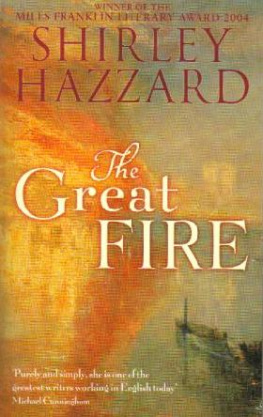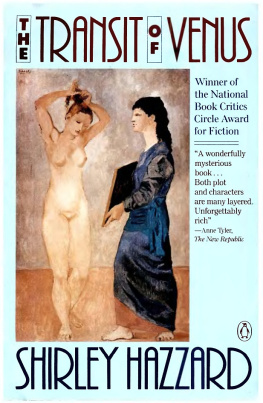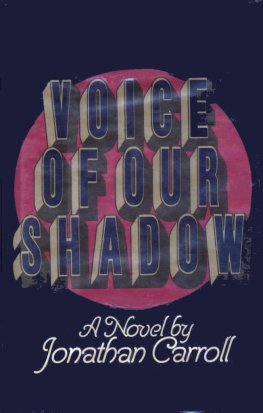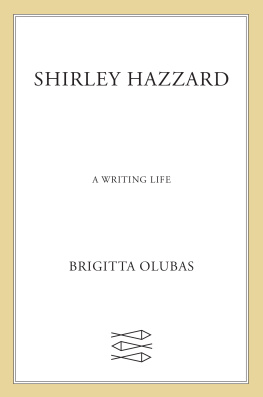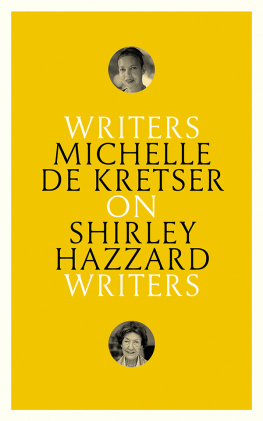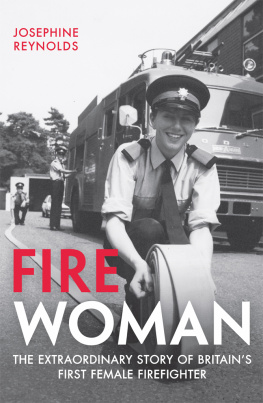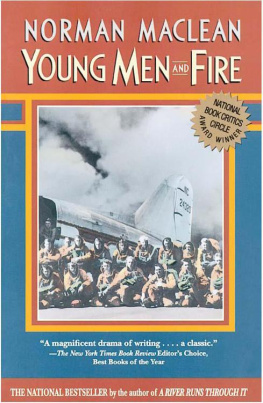
THE GREAT FIRE
SHIRLEY HAZZARD
First published in Great Britain by Virago Press 2003
Reprinted 2003, 2004 (five times)
First published in the United States by Farrar, Straus & Giroux LLC 2003
Copyright Shirley Hazzard 2003
ISBN 1 84408 139 7
FOR F. S.
Parce que, j'ai voulu te redire je t'aime
Et que le mot fait mal quand il est dit sans toi.
LOUIS ARAGON
Part One

Now they were starting. Finality ran through the train, an exhalation. There were thuds, hoots, whistles, and the shrieks of late arrivals. From a megaphone announcements were incomprehensible in American and Japanese. Before the train had moved at all, the platform faces receded into the expression of those who remain.
Aldred Leith sat by a window, his body submissively chugging as they got under way. He would presently see that rain continued to fall on the charred suburbs of Tokyo, raising, even within the train, a spectral odour of cinders. Meanwhile, he was examining a photograph of his father. Leith was holding a book in his right hand not reading, but looking at a likeness of his father on the back cover.
It was one of those pictures, the author at his desk. In an enactment of momentary interruption, the man was half-turned to the camera, left elbow on blotter, right hand splayed over knee. Features fine and lined, light eyes, one eyelid drooping. A taut mouth. Forehead full, full crop of longish white hair. The torso broad but spare; the clothes unaffected, old and good. As a boy, Leith had wondered how his father could always have good clothes so seldom renewed a seeming impossibility, like having a perpetual two days' growth of beard.
The expression, not calm but contained, was unrevealing. Siding with the man, the furniture supplied few clues: a secretary of dark wood was fitted in its top section with pigeonholes and small closed drawers. This desk had been so much part of the climate of family life, indivisible from his father's moods and even appearing, to the child, to generate them that the son had never until now inspected it with adult eyes. For that measure of detachment, a global conflict had been required, a wartime absence, a voyage across the world, a long walk through Asia; a wet morning and strange train.
There was no telephone on the desk, no clock or calendar. A bowl of blown roses, implausibly prominent, had perhaps been borrowed, by the photographer, from another room. On the blotter, two handwritten pages were shielded by the tweedy sleeve. Pens and pencils fanned from a holder alongside new books whose titles, just legible, were those of Oliver Leith's novels in postwar translations. There were bills on a spike, a glass dish of clips, a paperweight in onyx. No imaginable colours, other than those of the foisted flowers; no object that invited, by its form or material, the pressure of a hand. No photograph. Nothing to suggest familiarity or attachment.
The adult son thought the picture loveless. The father who had famously written about love love of self, of places, of women and men was renowned for a private detachment. His life, and that of his wife, his child, was a tale of dislocation: there were novels of love from Manchuria to Madagascar. The book newly to hand, outcome of a grim postwar winter in Greece, could be no exception. And was called Parthenon Freeze.
If the man had stood up and walked from the picture, the strong torso would have been seen to dwindle into the stockiness of shortish legs. The son's greater height, not immoderate, came through his mother; his dark eyes also.
All this time, Leith's body had been gathering speed. Putting the book aside, he interested himself in the world at the window: wet town giving way to fields, fields soggily surrendering to landscape. The whole truncated from time to time by an abrupt tunnel or the lash of an incoming train. Body went on ahead; thought hung back. The body could give a good account of itself so many cities, villages, countries; so many encounters, such privation and exertion should, in anyone's eyes, constitute achievement. Leith's father had himself flourished the trick of mobility, fretting himself into receptivity and fresh impression. The son was inclined to recall the platform farewells.
He had the shabby little compartment to himself. It was locked, and he had been given a key. It was clean, and the window had been washed. Other sections of the train were crammed with famished, threadbare Japanese. But the victors travelled at their ease, inviolable in their alien uniforms. Ahead and behind, the vanquished overflowed hard benches and soiled corridors: men, women, infants, in the miasma of endurance. In the steam of humanity and the stench from an appalling latrine. Deploring, Aldred Leith was nevertheless grateful for solitude, and spread his belongings on the opposite seat. Having looked awhile at Asia from his window, he brought out a different, heavier book from his canvas bag.
In that spring of 1947, Leith was thirty-two years old. He did not consider himself young. Like others of his generation, had perhaps never quite done so, being born into knowledge of the Great War. In the thoughtful child, as in the imaginative and travelled schoolboy, the desire had been for growth: to be up and away. From the university where he did well and made friends, he had strolled forth distinctive. Then came the forced march of resumed war. After that, there was no doubling back to recover one's youth or take up the slack. In the wake of so much death, the necessity to assemble life became both urgent and oppressive.
Where traceable, his paternal ancestors had been, while solidly professional, enlivened by oddity. His grandfather, derided by relatives as an impecunious dilettante, had spiked all guns by inventing, at an advanced age, a simple mechanical process that made his fortune. Aldred's father, starting out as a geologist whose youthful surveys in high places Bhutan, the Caucasus produced, first, lucid articles, had soon followed these with by lucid harsh short stories. The subsequent novels, astringently romantic, brought him autonomy and fame. Renouncing geology, he had kept a finger, even so, on the pulse of that first profession, introducing it with authority here and there in his varied narratives: the Jurassic rocks of East Greenland, the lavatic strata of far islands; these played their parts in the plot. In Oliver Leith's house in Norfolk there hung a painting of the youthful geologist prowling the moraines on his shortish legs. A picture consequential yet inept, like a portrait by Benjamin Robert Haydon.
Leith's mother, by birth a Londoner, was of Scots descent. There were red-cheeked relatives, well connected. A fine tall stone house, freezing away near Inverness, had been a place of cousinly convergence in summers before the Second World War. Aldred had not been an only child: a younger sister had died in childhood from diphtheria. It was then that his mother had begun to accompany, or follow, her husband on his journeys, taking their son with her.
And on the move ever since, the son thought, looking from his window at the stricken coasts of Japan. Two years ago, as war was ending, he had intended to create for himself a fixed point, some centre from which departures might be made the decision seeming, at the time, entirely his to make. Instead, at an immense distance from anything resembling home, he wondered with unconcern what circumstance would next transform the story.
From a habit of self-reliance, he was used to his own moods and did not mind an occasional touch of fatalism. He had, himself, some fame, quite unlike his father's and quite unsought.
Next page
